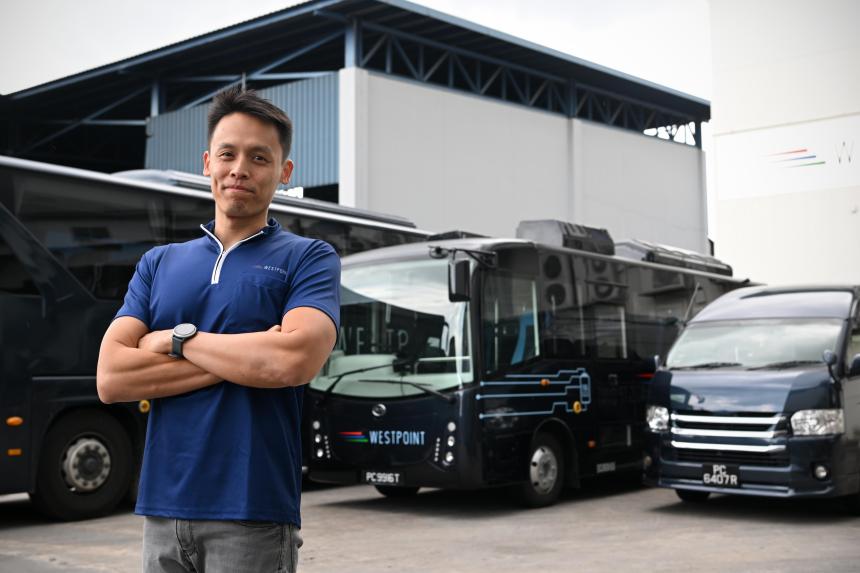SINGAPORE – Relatives, and even his own mother, did not like the idea of Mr Aeneas Liow working as a bus driver.
They thought it was a “tough, dangerous and tiring job” that was “unfit” for a young university graduate like him, Mr Liow, 27, told The Straits Times.
“But which job is not tough?” he countered. Furthermore, he has been fascinated by transportation since he was in primary school.
Despite not having the backing of his family members, Mr Liow, who graduated from the Singapore Institute of Technology in 2023 with a degree in air transport management, decided to follow his heart anyway.
He drove buses for public transport operator SMRT in 2019 and 2020 before pursuing his degree, during which he also steered shuttle buses for ComfortDelgro. On Jan 18, he successfully applied for a driving job with private firm Westpoint Transit.

In December 2023, Westpoint announced a revised pay structure where the starting monthly salary for driving a medium-sized bus is $3,500, while that for a driver of a 45-seater charter bus is $5,000.
This is above the starting salaries offered by private bus companies that range from $1,800 to $4,500, according to listings on recruitment websites.
Westpoint’s attractive figures are sweetened further by a joining bonus of $7,500 for those driving a medium-sized bus and $10,000 for those driving a 45-seater.
The only catch to the company’s bonus offer is that hired drivers must serve a three-year bond and will receive the quantum in batches, up till their sixth month. If they decide to leave before the full bond is served, they must pay back a pro-rated portion of the bonus.
Westpoint director Lionel Lee told ST that Mr Liow – who will be driving a medium-sized bus – is one of seven candidates that the company has offered a job to.
Since its December announcement, Westpoint has received over 1,300 applications, 30 of whom are graduates like Mr Liow, added Mr Lee. Westpoint aims to hire up to another 23 Singaporean or permanent resident drivers by mid-April.
Mr Lee, 37, a second-generation leader of Westpoint, said that he decided to offer a more attractive salary, and joining bonus, to potential drivers to beat a manpower crunch.
Before its hiring campaign, most candidates who applied for Westpoint’s job postings were over 45 years old, he said, adding that there is a lack of newcomers as many young people view bus-driving as a labour-intensive job that does not pay well.
The search for younger local drivers, said Mr Lee, is crucial because of the Ministry of Manpower’s foreign employee quota. For example, a company in the services sector with 10 local employees can potentially hire up to five foreign workers, including one S-Pass holder.
“If we do not try to solve this problem now, the shortage of drivers will become a serious issue in the next five to 10 years,” said Mr Lee, who took over the reins of the company from his parents in January 2022.
He added: “We can wait for the Government to give us more quota to hire foreigners, but (as a private transport provider), I feel that we need to take the initiative, lead the way in setting an example and make this industry ready for the future.”
About 53 per cent of the total applications for Westpoint’s job openings were made by those under the age of 45. Of the seven hired, five are under 45, and two are graduates.
Those figures appear to show that younger members of the workforce have been swayed by the competitive salaries offered by Mr Lee and his company, which are comparable with what fresh graduates earn in other industries.
According to the Joint Autonomous Universities Graduate Employment Survey 2022, the median gross monthly salary among fresh graduates in full-time permanent jobs was $4,200 in 2022.
“It is unfortunate that drivers do struggle financially to make ends meet and we often hear things like, ‘I hope my children don’t become bus drivers’,” said Mr Lee, who said he has set aside about $750,000 for the hiring push.
“I hope that (this initiative) will right this wrong so that the drivers get the remuneration they deserve. We need to take care of our people first, followed by the product, before the profits can come in.”
Other private bus transport operators ST spoke to echoed the same challenges Mr Lee highlighted, and said that high incentives are not common in the industry.
Tian Lang Xing Singapore director Eugene Khoo, whose company offers a joining bonus of $2,000 with a nine-month bond, said that the salary package it offers is subjective and varies based on the project a driver signs up for, which can include transportation for events like school trips.
Long Lim Group operations manager Ang Zi Wei said joining bonuses may affect smaller companies which cannot compete on that front.
“Some drivers will job-hop to those companies offering it,” said Mr Ang, adding that his company, which started in 2011, mainly operates school buses and cannot offer more than those serving tour groups, which usually pay better.
Mr Phillip Peh, president of the Singapore School and Private Hire Bus Owners’ Association, said the association does not dictate the salaries or incentives offered by private bus companies.
However, Mr Peh, who is also the general manager of Tong Tar Transport, welcomed the move to offer high retention and joining bonuses as a way to attract newcomers to the trade.
Human resources expert Jasper Toh noted that the salary and incentives offered by companies like Westpoint may be attractive to woo university graduates to join them at the start but these new hires may become more concerned with growth opportunities and exposure as they advance their careers.
“Younger job seekers are looking for more variety in learning and upskilling opportunities,” said Mr Toh, the director of human resource firm Impact Best.
“A (planned) career progression that allows horizontal progression of moving into a back-office role after getting exposure puts the employer in a better position for talent retention.”
“Also, with the possible integration of technology, such as autonomous driving, it would be more ideal to put focus on career planning for the next three to five years and highlight more opportunities for horizontal or cross-department progression,” he added.
When asked if Westpoint’s pay was comparable with his last salary at SMRT, where he spent three months as an executive after graduating, Mr Liow agreed.
“It’s a slight pay cut from my former position, but I don’t mind as I get to pursue my interest and there are fewer commitments as well,” he said. “Being a bus driver may seem like a dead end to some but I feel that opportunities are created by oneself. I hope that I can go into the office whenever I’m free to learn more about (Westpoint’s) operations and grow in the company.”


